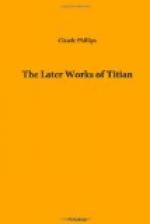It has always excited a certain sense of distrust in Titian, and caused the world to form a lower estimate of his character than it would otherwise have done, that he should have been capable of thus living in the closest and most fraternal intimacy with a man so spotted and in many ways so infamous as Aretino. Without precisely calling Titian to account in set terms, his biographers Crowe and Cavalcaselle, and above all M. Georges Lafenestre in La Vie et L’Oeuvre du Titien, have relentlessly raked up Aretino’s past before he came together with the Cadorine, and as pitilessly laid bare that organised system of professional sycophancy, adulation, scurrilous libel, and blackmail, which was the foundation and the backbone of his life of outward pomp and luxurious ease at Venice. By them, as by his other biographers, he has been judged, not indeed unjustly, yet perhaps too much from the standard of our own time, too little from that of his own. With all his infamies, Aretino was a man whom sovereigns and princes, nay even pontiffs, delighted to honour, or rather to distinguish by honours. The Marquess Federigo Gonzaga of Mantua, the Duke Guidobaldo ii. of Urbino, among many others, showed themselves ready to propitiate him; and such a man as Titian the worldly-wise, the lover of splendid living to whom ample means and the fruitful favour of the great were a necessity; who was grasping yet not avaricious, who loved wealth chiefly because it secured material consideration and a life of serene enjoyment; such a man could not be expected to rise superior to the temptations presented by a friendship with Aretino, or to despise the immense advantages which it included. As he is revealed by his biographers, and above all by himself, Aretino was essentially “good company.” He could pass off his most flagrant misdeeds, his worst sallies, with a certain large and Rabelaisian gaiety; if he made money his chief god, it was to spend it in magnificent clothes and high living, but also at times with an intelligent and even a beneficent liberality. He was a fine though not an unerring connoisseur of art, he had a passionate love of music, and an unusually exquisite perception of the beauties of Nature.
To hint that the lower nature of the man corrupted that of Titian, and exercised a disintegrating influence over his art, would be to go far beyond the requirements of the case. The great Venetian, though he might at this stage be much nearer to earth than in those early days when he was enveloped in the golden glow of Giorgione’s overmastering influence, could never have lowered himself to the level of those too famous Sonetti Lussuriosi which brought down the vengeance of even a Medici Pope (Clement VII.) upon Aretino the writer, Giulio Romano the illustrator, and Marcantonio Raimondi the engraver. Gracious and dignified in sensuousness he always remained even when, as at this middle stage of his career, the vivifying shafts of poetry no longer pierced through, and transmuted




